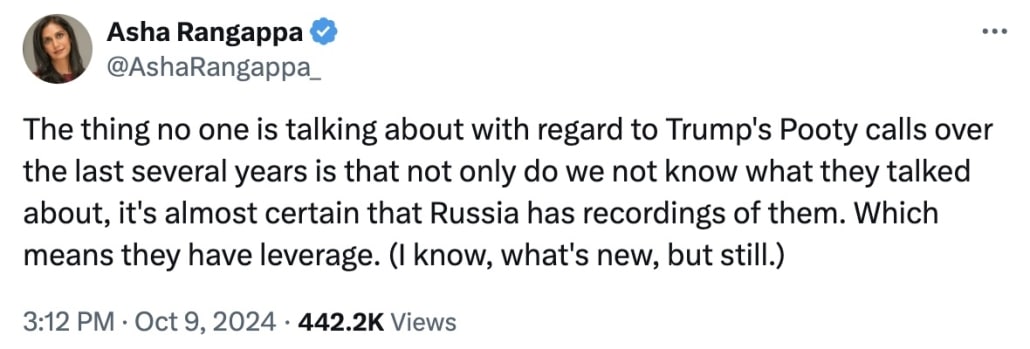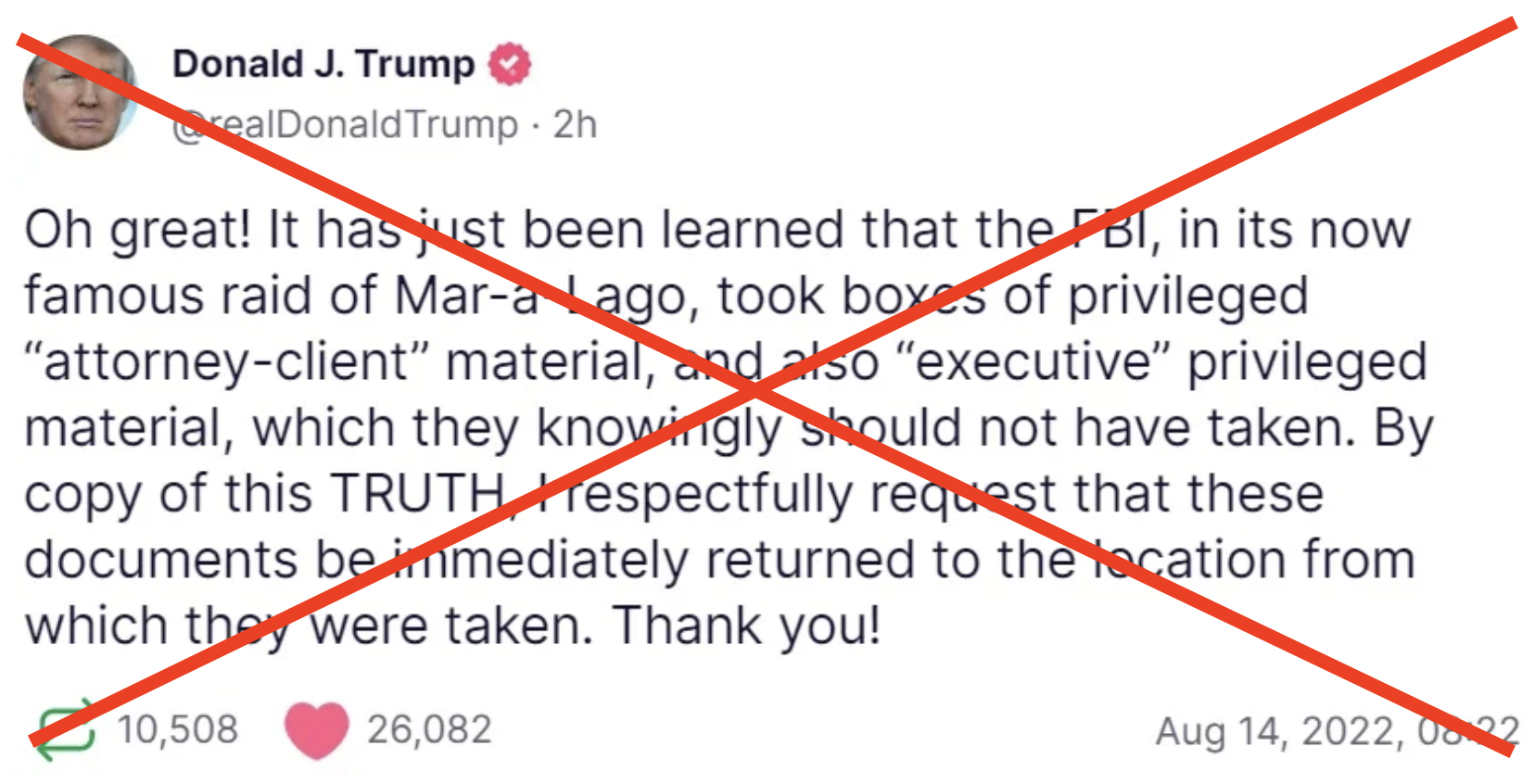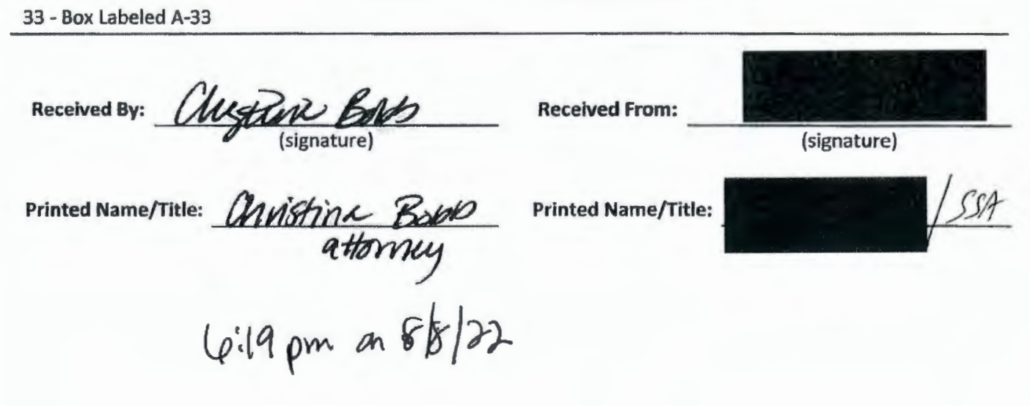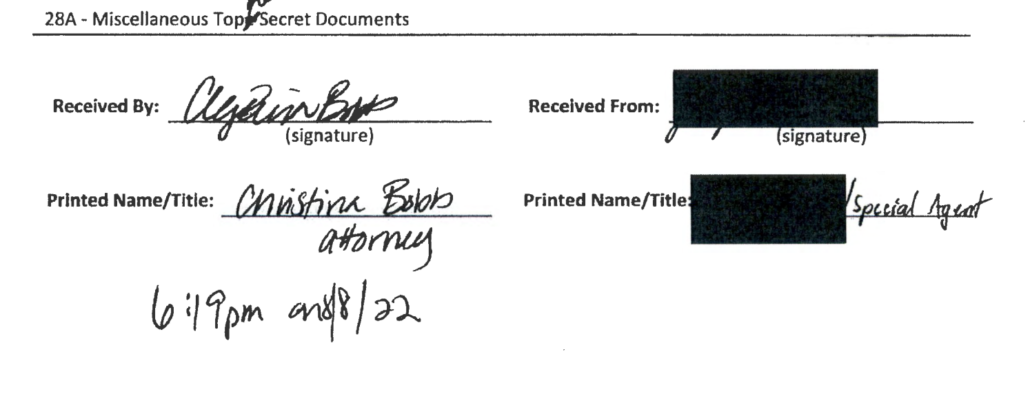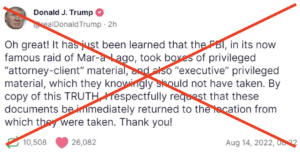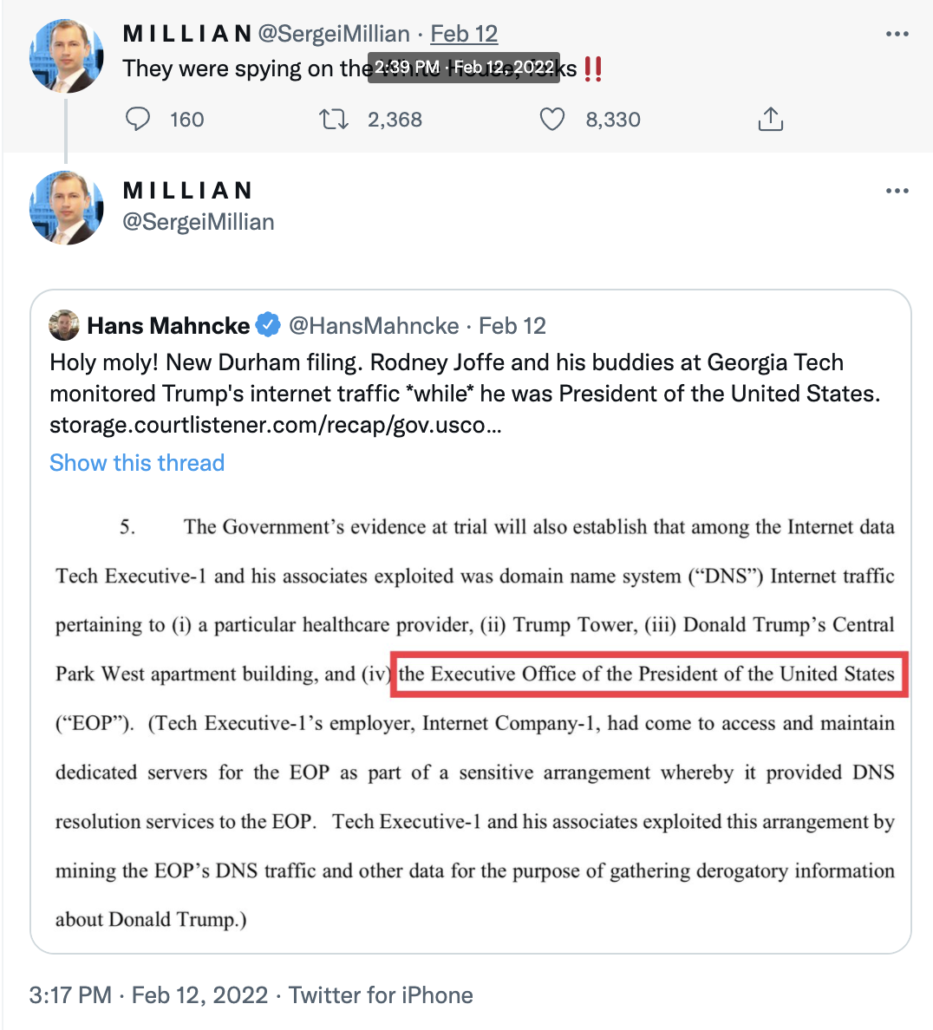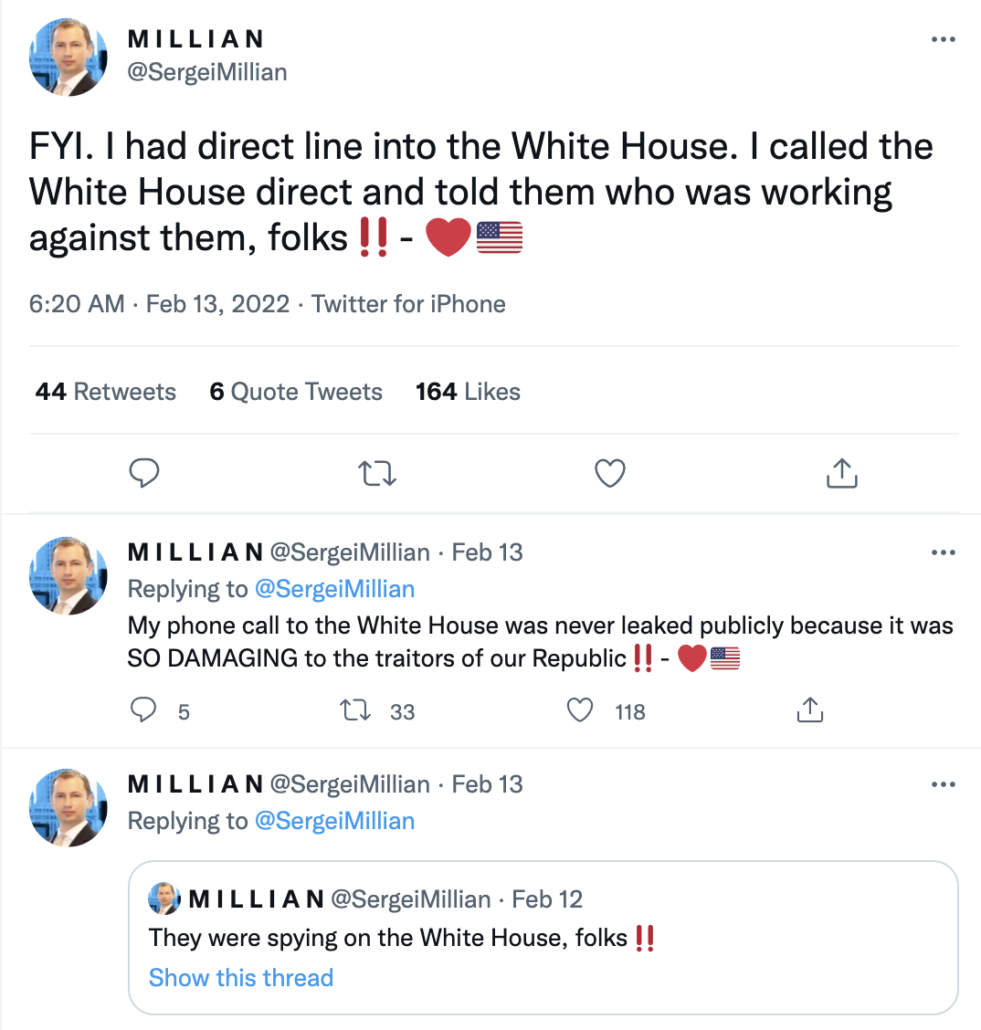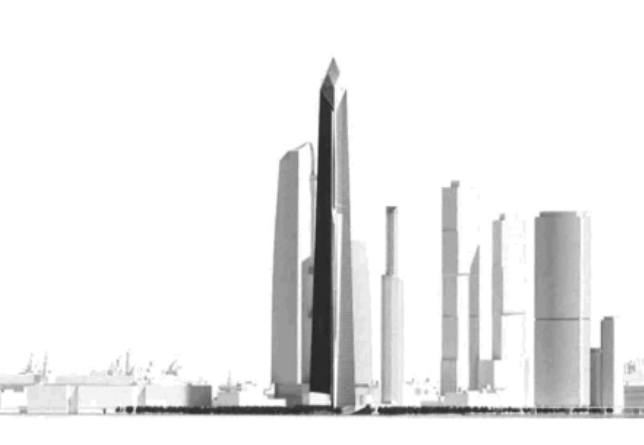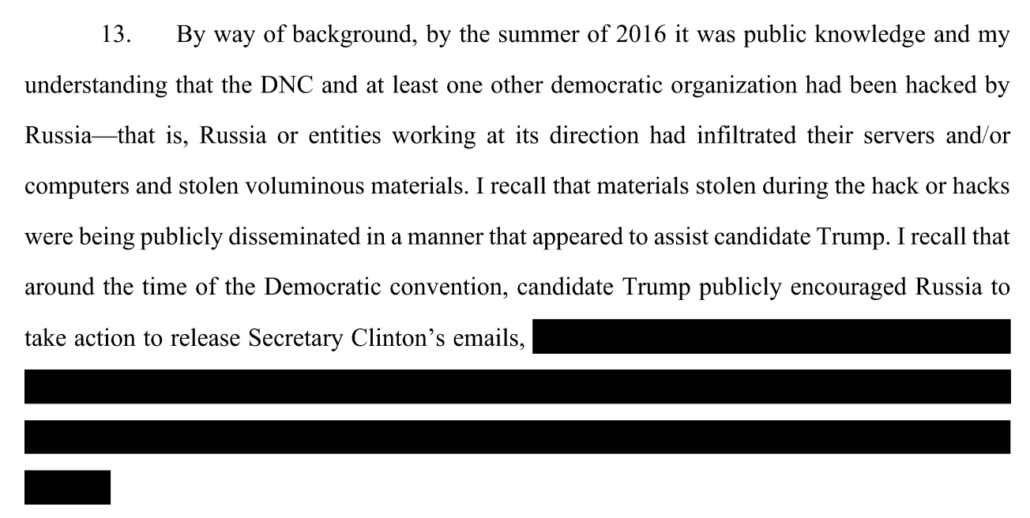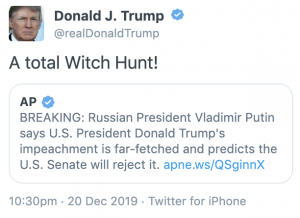Legal commentators who ignored the run-up to the Michael Sussmann trial and still have not reported on the evidence of abuse and incompetence are writing posts claiming it was always clear that the jury in that case would return an acquittal. The same people, however, are suggesting there might be more to the Igor Danchenko charges.
I wrote a whole series of posts laying out why that’s wrong — the last one, with links to the others, is here. In addition, I’ve been tracking Durham’s difficulties obtaining classified discovery from other parts of DOJ here. This post pulls together the problems Durham faces in his second trial, which is currently scheduled to start on October 11.
As a reminder, the Danchenko indictment charges the former Christopher Steele source with telling five lies to the FBI in interviews in which they tried to vet the Steele dossier:
- One alleged lie on June 15, 2017 about whether he had spoken with Chuck Dolan “about any material contained in the” dossier.
- Four alleged lies, told in interviews on March 16, May 18, October 24, and November 16, 2017, that he spoke to Sergei Millian in late July 2016 when Danchenko knew (variably in 2016 or in the interviews in 2017) that he had never spoken with him; one charged lie accuses Danchenko of wittingly lying about speaking to Millian more than once.
Durham will have to prove that these five statements were intentional lies and that they were material to the FBI’s operations.
Danchenko could get his former lawyer to testify
Before looking at the problems with each of those claimed lies and their materiality, consider that shortly after being charged, Danchenko replaced Mark Schamel, who represented Danchenko in his 2017 interviews with the FBI, with a team led by Lowenstein Sandler’s Stuart Sears. This makes it possible for Danchenko to do something risky but in this case potentially warranted: have his former attorney testify.
The interview report from his initial series of interviews in January 2017 shows that Danchenko was uncertain about the answer to some questions, but over the course of three days, checked his own records and corrected himself when he realized he had made an error in answering an affirmative question from the FBI. In at least one case, Danchenko also provided proof to back one of his claims. Schamel could explain how diligently he and Danchenko prepared for these interviews, how Danchenko corrected himself when he realized he was wrong, and the perceived focus — by all appearances, on Danchenko’s Russian sources — of the FBI interviews.
In short, Schamel’s testimony could go a long way to demonstrating that where Danchenko made an error, it was not willful.
The FBI didn’t ask the question about Chuck Dolan that Durham claims they did
Then there are the charges themselves. There are two potentially fatal problems with the single charge built around Chuck Dolan, which Durham has used to insinuate, with no evidence, that the minor Hillary supporter was the source of the pee tape allegation. The alleged lie Durham has accused Danchenko of, though, pertains to a more general question: whether Danchenko had “denied … that he had spoken to [Dolan] about any material” in the dossier.
Except, as happened repeatedly in his indictment of Danchenko, that’s neither what Danchenko was asked nor what he answered.
As I laid out in this post, it appears that Danchenko was asked whether Dolan was a source for Steele, not whether he was a source for Danchenko.
FBI AGENT-1: Um, because obviously I don’t think you’re the only …
DANCHENKO: Mm-hmm.
FBI AGENT-1: Person that has been contributing. You may have said one – and this is the other thing we are trying to figure out.
[ … ]
FBI AGENT-1: Do you know a [PR Executive-1]?
DANCHENKO: Do I know [PR Executive-1]? Yeah.
FBI AGENT-1: How long have you known him? [laughing] [pause]
DANCHENKO: I’ve known [PR-Executive-1] for [pause] I don’t know, a couple years maybe.
FBI AGENT-1: Couple years?
DANCHENKO: But but but but but but but I’ve known of him for like 12 years.
[ … ]
DANCHENKO: Yeah. Yeah he likes Russia. I don’t think he is, uh, – would be any way be involved. But-but-uh-b-but he’s uh [UI] what I would think would be easily played. Maybe. Uh, he’s a bit naive in his, um liking of Russia. [emphasis Durham’s]
The question was premised on Steele having other primary subsources other than Danchenko and his response was a denial of the possibility that Dolan was one of them. All of Danchenko’s responses could be framed with that understanding of the question.
Durham’s alleged false statement appears to stem from a follow-up question. But there, Durham has completely misrepresented Danchenko’s answer.
FBI AGENT-1: Okay, so you’ve had … was there any … but you had never talked to [PR Executive-1] about anything that showed up in the dossier [Company Reports] right?
DANCHENKO: No.
FBI AGENT-1: You don’t think so?
DANCHENKO: No. We talked about, you know, related issues perhaps but no, no, no, nothing specific. [emphasis Durham’s]
Danchenko explicitly told the FBI that he talked to Dolan about “related issues.” Particularly as regards the pee tape, Danchenko might consider using information from Dolan for further investigation a “related issue” but not the core issue that the FBI was interested in.
As to the report for which Durham presents compelling evidence that Dolan was the source, Durham presents no evidence of specific questioning about it, and there’s abundant evidence that Danchenko was never sure which reports came from him and which (he assumed) came from others.
Durham did not present any evidence that Danchenko denied, in response to specific questions about whether Dolan was involved in identified reports, that Dolan played a role in the dossier. He has evidence that Danchenko answered a question about something else, and then, in a follow-up, gave a much more equivocal response than Durham claims he gave.
Another Durham materiality claim fizzles after he actually investigates
Plus, it is virtually certain that Danchenko will be able to prove that his equivocal response could not have been material.
That’s because — as a declassified footnote of the DOJ IG Report makes clear — the reason the FBI asked these questions about Dolan on June 15, 2017 was because FBI had recently obtained Section 702 material showing conversations between Danchenko’s source, Olga Galkina, and Dolan.
The FBI [received information in early June 2017 which revealed that, among other things, there were [redacted]] personal and business ties between the sub-source and Steele’s Primary Sub-source; contacts between the sub-source and an individual in the Russian Presidential Administration in June/July 2016; [redacted] and the sub‐source voicing strong support for candidate Clinton in the 2016 U.S. elections. The Supervisory Intel Analyst told us that the FBI did not have Section 702 coverage on any other Steele sub‐source. [my emphasis]
That is, the reason the FBI was asking these questions in the first place is because they were trying to understand the communications they had just discovered between Dolan and Danchenko.
As the indictment lays out, Danchenko didn’t hide the key details about Dolan — that he was doing business in Russia, had ties with Dmitry Peskov, and had developed a business relationship with Galkina.
In a later part of the conversation, DANCHENKO stated, in substance and in part, that PR Executive-1 had traveled on the October “delegation” to Moscow; that PR Executive-1 conducted business with Business-1 and Russian Sub-source-1; and that PR Executive-1 had a professional relationship with Russian Press Secretary-1.
Durham claimed that Danchenko’s imagined lie was material because it deprived the FBI from obtaining information on Dolan.
DANCHENKO’s lies denying PR Executive-1 ‘s role in specific information referenced in the Company Reports were material to the FBI because, among other reasons, they deprived FBI agents and analysts of probative information concerning PR Executive-1 that would have, among other things, assisted them in evaluating the credibility, reliability, and veracity of the Company Reports, including DANCHENKO’s sub-sources.
We now know that, at the time Durham made this claim, he had barely begun the process of obtaining relevant evidence from DOJ IG. Even in the Michael Sussmann case, Durham first made a formal discovery request of Michael Horowitz’s office on October 13, 2021, almost a month after charging Sussmann (and just three weeks before indicting Danchenko). Durham didn’t receive materials that completely undermined his case against Sussmann until March.
From that, it’s fairly safe to assume that Durham (again) didn’t bother to test whether there was any basis for his materiality claims before building a long speaking indictment around them.
The FBI didn’t need Danchenko to tell them about Dolan’s Russian ties. They had discovered that already from 702 collection targeting Galkina. That’s precisely why they asked Danchenko whether Dolan could be another Steele source. And when asked for more details, Dahchenko offered up the details that FBI would have been looking for.
Durham’s due diligence problems on the Sergei Millian charges
There are several kinds of problems with the remaining four counts. As noted, four of the charges against Danchenko accuse him of hiding what Durham claims is affirmative knowledge (arguably in real time) that Sergei Millian never called him in late July 2016.
As a threshold matter, there’s no language in the Danchenko indictment suggesting Durham has affirmative proof that such a call didn’t happen — whether from Millian or anyone else. In his FBI interview, Danchenko suggested the call may have happened on a secure app and he said he had replaced the phone he used at the time. So it’s not clear that Durham can rule out a call on Signal or similar encrypted app. When Durham first rolled out this indictment, I thought such a claim would be reckless, but we now know Durham built his entire Sussmann indictment around billing records even though Durham had affirmative proof (in his taxi reimbursement) that Sussmann did not bill Hillary for his meeting with the FBI.
Worse still, even in the transcripts that Durham miscites in the indictment, Danchenko included a bunch of caveats that Durham does not include in his charging language: “I don’t know,” “at the time I was under the impression it was him,” “at least someone I thought was him.”
That creates a temporal problem with the way Durham has charged this. Even if Danchenko came to believe later in 2016 or in 2017 that he never spoke with Millian, in his interviews, Danchenko was answering about what he believed to be the case in July 2016, when he shared this report with Christopher Steele. All Danchenko was claiming was that he talked to some journalists at a Russian outlet, someone called Danchenko shortly thereafter (at a time, it should be said, when Oleg Deripaska likely already knew of the dossier project), and Danchenko assumed it was Millian because it was the most logical explanation. From the start, Danchenko always admitted his uncertainty about that call.
Durham is relying on a Twitter feed he has already said makes false claims about the Durham investigation
Then there’s the fact that Durham is relying on Sergei Millian as a witness against Danchenko.
As I noted last year, in his indictment, Durham claimed to prove that such a call had not happened based on Millian’s say-so. But not actual testimony. Rather, at that point, Durham was relying on Sergei Millian’s Twitter feed.
Chamber President-1 has claimed in public statements and on social media that he never responded to DANCHEKNO’s [sic] emails, and that he and DANCHENKO never met or communicated.
That was batshit insane then, not least because over the years journalists and others have raised real questions about the authenticity of Millian’s Twitter account. And since charging Danchenko, Millian has repeatedly made claims on Twitter that utterly demolishes the credibility of Millian’s Twitter feed.
Millian has played a key role in the “sleuths corner” that has ginned up all sorts of false claims about Durham’s investigation.
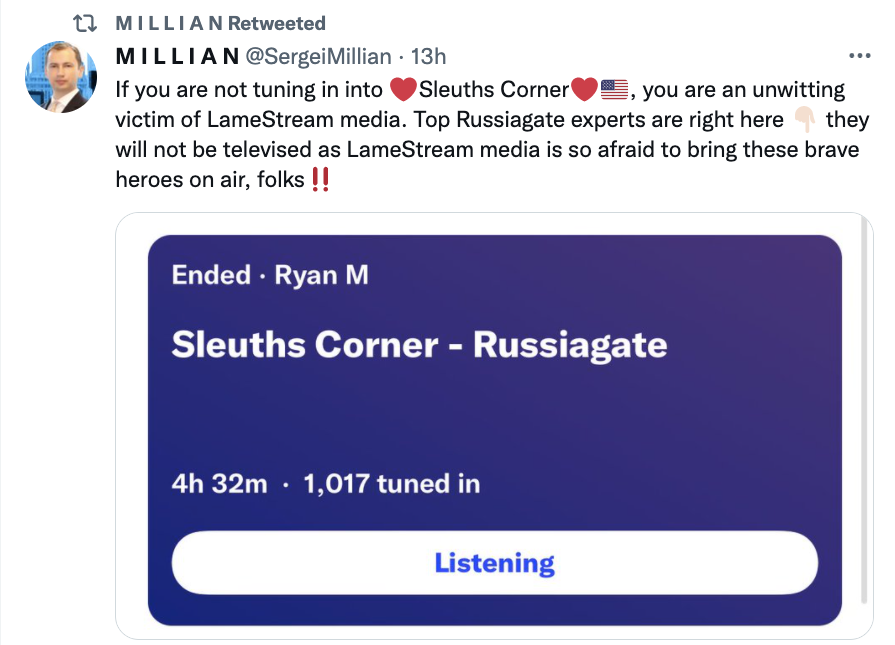
This explicit affiliation will entitle Danchenko to subpoena the activity of the group, and even if Millian were entirely credible, there are a number of people associated with the corner who are not.
Then, as part of his role in generating froth about the Durham investigation, Millian played a central role in misrepresenting a claim Durham had made in a filing in the Sussmann case, suggesting that Durham had proven that researchers had spied on the Trump White House.
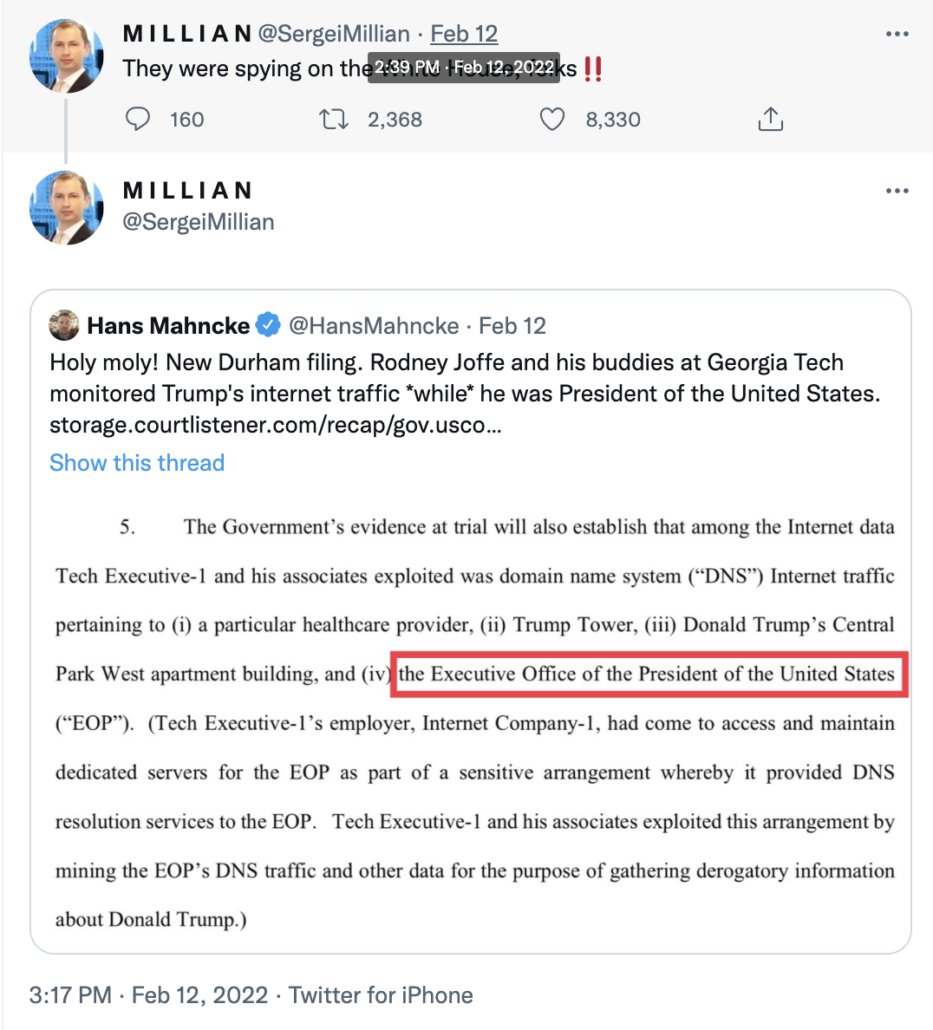
This led Durham to formally state that those who made such claims were “misrepresent[ing] facts contained in the Government’s Motion.” So Durham has publicly accused his star witness — Sergei Millian’s Twitter feed — of making false claims about matters pertaining to Durham’s investigation.
Worse still, in the same time period, Millian claimed that he had called the White House and told them “who was working against them.”
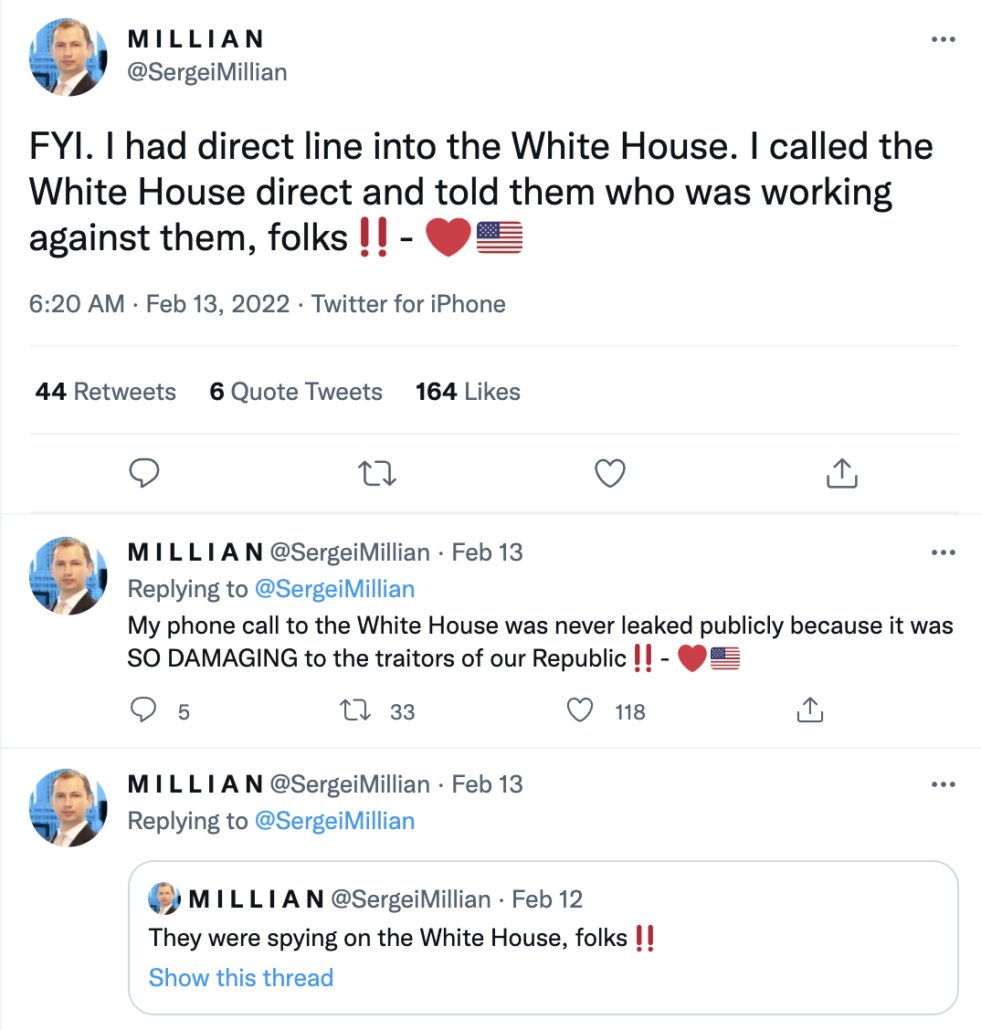
That reflects the kind of knowledge that could only come from a concerted effort, in real time (seemingly in 2016), to fuck with the Fusion investigation, followed by a subsequent effort (at such time when Trump was in the White House), to exact a cost for the investigation. Effectively, with this tweet, Millian confessed to being part of the effort to undermine the Russian investigation. That makes Millian’s contact with Deripaska in 2016 all the more problematic, since Deripaska has seemingly carried out a sustained campaign to attack the Russian investigation. But it also suggests that Millian’s claims to have entirely blown off Danchenko’s quetions were false.
Millian has since claimed that Durham’s office was trying to keep him off Twitter, but that he refused because he wants to attack his enemies.

This is all just stuff that Millian has done since the indictment, and to the extent earlier Millian tweets are preserved showing professed knowledge of the 2016 Russian operation (as some are), Danchenko would be able to use those at trial as well.
Which may be why — at least according to Millian’s unreliable Twitter feed — Durham is now trying to get Millian to come testify at trial. But Millian suggests that testifying under oath to the claims he has been making on Twitter for years would amount to “using him.”
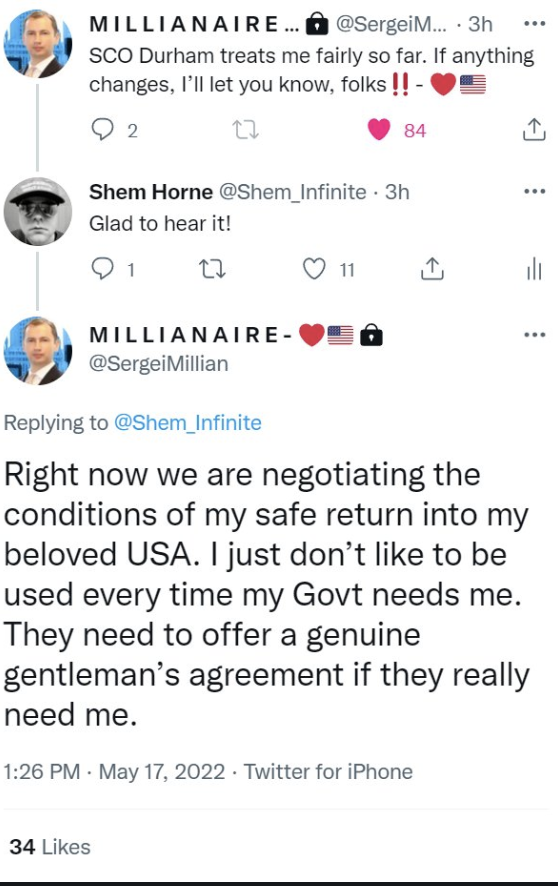
Durham’s star witness refuses to return to the US without some kind of “gentleman’s agreement” regarding his “safe return.” That’s not going to be a very credible witness on the stand, if he even shows up to testify.
The counterintelligence investigation against Millian was real in 2016 and may be realer now
Which leads us, again, to Durham’s failures to do basic investigation before charging these indictments.
We know Durham didn’t reach out to Michael Horowitz until weeks before charging Danchenko. The Sussmann case made it clear Durham had not received centrally relevant evidence in the Sussmann case until March.
That means Durham may not have been aware of the public evidence — in both the DOJ IG Report and declassified footnotes — describing the counterintelligence investigation opened on Millian in October 2016, which was opened in NY (where Millian lived at the time), not DC (where Fusion and others were also raising concerns).
In addition, we learned that [Millian] was at the time the subject of an open FBI counterintelligence investigation. 302 We also were concerned that the FISA application did not disclose to the court the FBI’s belief that this sub-source was, at the time of the application, the subject of such an investigation. We were told that the Department will usually share with the FISC the fact that a source is a subject in an open case. The OI Attorney told us he did not recall knowing this information at the time of the first application, even though NYFO opened the case after consulting with and notifying Case Agent 1 and SSA 1 prior to October 12, 2016, nine days before the FISA application was filed. Case Agent 1 said that he may have mentioned the case to the OI Attorney “in passing,” but he did not specifically recall doing so. 303
301 As discussed in Chapter Four, [Millian] [redacted]
302 According to a document circulated among Crossfire Hurricane team members and supervisors in early October 2016, [Millian] had historical contact with persons and entities suspected of being linked to RIS. The document described reporting [redacted] that [Millian] “was rumored to be a former KGB/SVR officer.” In addition, in late December 2016, Department Attorney Bruce Ohr told SSA 1 that he had met with Glenn Simpson and that Simpson had assessed that [Millian] was a RIS officer who was central in connecting Trump to Russia.
We know Durham has little familiarity with the Mueller Report, much less the underlying investigation. Which means he similarly may not have considered the evidence that Millian was cultivating George Papadopoulos during precisely the same weeks when Danchenko was contacting Millian for information on Trump.
Papadopoulos first connected with Millian via LinkedIn on July 15, 2016, shortly after Papadopoulos had attended the TAG Summit with Clovis.500 Millian, an American citizen who is a native of Belarus, introduced himself “as president of [the] New York-based Russian American Chamber of Commerce,” and claimed that through that position he had “insider knowledge and direct access to the top hierarchy in Russian politics.”501 Papadopoulos asked Timofeev whether he had heard of Millian.502 Although Timofeev said no,503 Papadopoulos met Millian in New York City.504 The meetings took place on July 30 and August 1, 2016.505 Afterwards, Millian invited Papadopoulos to attend-and potentially speak at-two international energy conferences, including one that was to be held in Moscow in September 2016.506 Papadopoulos ultimately did not attend either conference.
On July 31 , 2016, following his first in-person meeting with Millian, Papadopoulos emailed Trump Campaign official Bo Denysyk to say that he had been contacted “by some leaders of Russian-American voters here in the US about their interest in voting for Mr. Trump,” and to ask whether he should “put you in touch with their group (US-Russia chamber of commerce).”507 Denysyk thanked Papadopoulos “for taking the initiative,” but asked him to “hold off with outreach to Russian-Americans” because “too many articles” had already portrayed the Campaign, then-campaign chairman Paul Manafort, and candidate Trump as “being pro-Russian.”508
On August 23, 2016, Millian sent a Facebook message to Papadopoulos promising that he would ” share with you a disruptive technology that might be instrumental in your political work for the campaign.”509 Papadopoulos claimed to have no recollection of this matter.510
On November 9, 2016, shortly after the election, Papadopoulos arranged to meet Millian in Chicago to discuss business opportunities, including potential work with Russian “billionaires who are not under sanctions.”511 The meeting took place on November 14, 2016, at the Trump Hotel and Tower in Chicago.512 According to Papadopoulos, the two men discussed partnering on business deals, but Papadopoulos perceived that Millian’s attitude toward him changed when Papadopoulos stated that he was only pursuing private-sector opportunities and was not interested in a job in the Administration.5 13 The two remained in contact, however, and had extended online discussions about possible business opportunities in Russia. 514 The two also arranged to meet at a Washington, D.C. bar when both attended Trump’s inauguration in late January 2017.515
More recently, as part of charges against a different Russian-American who fled because of a counterintelligence investigation, DOJ made clear that Millian’s organization knew at least by 2013 they should have registered as agents of Russia.
a. On or about January 30, 2013, BRANSON received an email from an individual using an email address ending in “mail.ru.” Based on my review of publicly available information, I have learned that this individual was a Senior Vice President of the Russian American Chamber of Commerce in the USA. This email had the subject line “Problem.” and the text of the email included, among other things, a portion of the FARA Unit’s website with background on FARA. In response, BRANSON wrote, in part, “I am interested in the number of the law, its text in English[.]” The sender then responded with “Lena, read …” and copied into the email background on FARA and portions of the statute.
All of which to say that Durham likely cannot make any “gentleman’s agreement” on DOJ’s behalf with Millian about coming to the US to testify against Danchenko, because other parts of DOJ have equities that significantly precede Durham’s, equities that pertain more directly to harm to the United States and current national security priorities.
Plus, even if Durham did succeed in bringing his star witness against Danchenko to EDVA to testify against him, even if Millian weren’t arrested on sealed charges when he landed, the trial would end up being a circus in which the evidence against Millian and the false claims Millian has made about the Durham investigation playing a more central role than the evidence against Danchenko.
There are few things Durham could do that would make it more clear how his witch hunt has served Russia’s interests, and not those of the US.
I mean, I’m all for it. But at some point Durham may come to recognize that’s not a winning case.
There is affirmative evidence that any alleged lies Danchenko told were not material
It’s not clear whether Sussmann jurors ever got as far as considering the materiality problems in the case against Sussmann. But, even on top of the specific problem arising from the Section 702 directive targeting Galkina, described above, Durham may have bigger materiality problems with Danchenko.
That’s because — as explained in the DOJ IG Report Durham didn’t read closely — FBI repeatedly made decisions that affirmatively reflect finding claims in the dossier and Danchenko’s interviews were not material to their decision to keep surveilling Carter Page.
That’s true, first of all, because the initial FISA targeting Page obtained useful information. Notes from Tashina Gaushar that Durham belatedly discovered in the Sussmann case described the FISAs against Page this way:
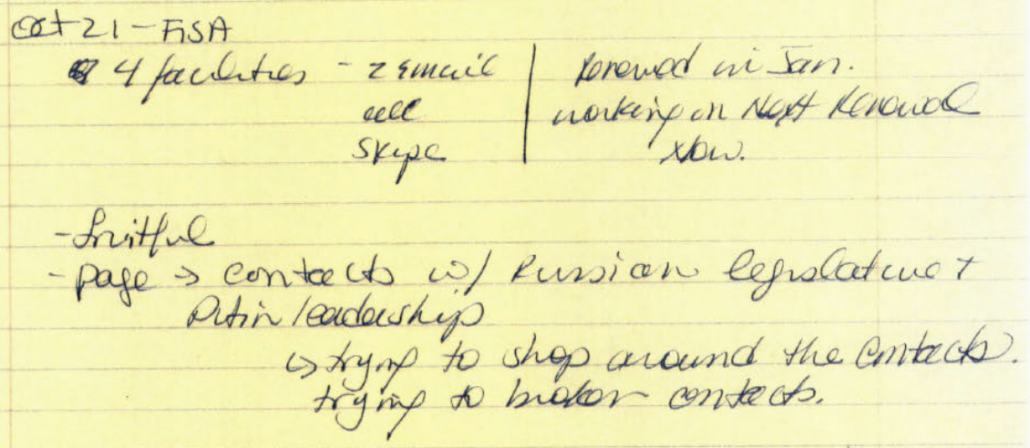
So before the FBI ever spoke to Danchenko, they had independent reason (on top of the counterintelligence concerns NYFO had used in March 2016 to open an investigation on Page) to target Page.
Moreover, the FBI started identifying problems with the Millian allegations before the first FISA, but never integrated those or Danchenko’s own interviews into their FISA applications.
Regarding the information in the first bullet above, in early October 2016, the FBI learned the true name of Person 1 (described in Report 95 as “Source E”). As described in Chapter Six, the Primary Sub-source told the FBI that he/she had one 10- to 15-minute telephone call with someone he/she believed to be Person 1, but who did not identify him/herself on the call. We found that, during his/her interview with the FBI, the Primary Sub-source did not describe a “conspiracy” between Russia and individuals associated with the Trump campaign or state that Carter Page served as an “intermediary” between Manafort and the Russian government. In addition, the FBl’s summary of the Primary Sub-source’s interview did not describe any discussions between the parties concerning the disclosure of DNC emails to Wikileaks in exchange for a campaign platform change on the Ukrainian issue. To the contrary, according to the interview summary, the Primary Sub-source told the FBI that Person 1 told him/her that there was “nothing bad” about the communications between the Kremlin and Trump, and that he/she did not recall any mention of Wikileaks. Further, although Steele informed the FBI that he had received all of the information in Report 95 from the Primary Sub-source, and Steele told the OIG the same thing when we interviewed him, the Primary Subsource told the FBI that he/she did not know where some of the information attributed to Source E in Report 95 came from. 388 Despite the inconsistencies between Steele’s reporting and the information his Primary Sub-source provided to the FBI, the subsequent FISA renewal applications continued to rely on the Steele information, without any revisions or notice to the court that the Primary Sub-source had contradicted the Steele reporting on key issues described in the renewal applications. Instead, as described previously, FISA Renewal Application Nos. 2 and 3 advised the court:
In an effort to further corroborate [Steele’s] reporting, the FBI has met with [Steele’s] [redacted] sub-source [Primary Sub-source] described immediately above. During these interviews, the FBI found the [redacted] subsource to be truthful and cooperative [redacted]. The FBI is undertaking additional investigative steps to further corroborate the information provide [sic] by [Steele] and [redacted]
It cannot be the case that FBI at once ignored everything Danchenko said that should have raised concerns, but also that Danchenko’s repetition of the things he said in his first interview would be material to later parts of the investigation. There’s a 478-page report laying out why that’s not the case.
As to the Dolan tie, the FBI obtained intelligence that the reports that most mattered to the ongoing Russian investigation — the sketchy Cohen-in-Prague stories sourced to Olga Galkina, stories that may well have arisen because Dolan vouched for Galkina with Peskov — were disinformation a week before first speaking to Danchenko.
A January 12, 2017, report relayed information from [redacted] outlining an inaccuracy in a limited subset of Steele’s reporting about the activities of Michael Cohen. The [redacted] stated that it did not have high confidence in this subset of Steele’s reporting and assessed that the referenced subset was part of a Russian disinformation campaign to denigrate U.S. foreign relations. A second report from the same [redacted] five days later stated that a person named in the limited subset of Steele’s reporting had denied representations in the reporting and the [redacted] assessed that the person’s denials were truthful.
As I have shown, Mueller did not use the Cohen reports at all in predicating the investigation against Trump’s lawyer.
Finally, the DOJ IG Report strongly suggests that the FBI was not going to get a fourth FISA targeting Page until they discovered two new facilities — probably one or more encrypted app and some financial accounts — they thought might answer some of their outstanding questions about Page.
[A]vailable documents indicate that one of the focuses of the Carter Page investigation at this time was obtaining his financial records. NYFO sought compulsory legal process in April 2017 for banking and financial records for Carter Page and his company, Global Energy Capital, as well as information relating to two encrypted online applications, one of which Page utilized on his cell phone. Documents reflect that agents also conducted multiple interviews of individuals associated with Carter Page.
Case Agent 6 told us, and documents reflect, that despite the ongoing investigation, the team did not expect to renew the Carter Page FISA before Renewal Application No. 2’s authority expired on June 30. Case Agent 6 said that the FISA collection the FBI had received during the second renewal period was not yielding any new information. The OGC Attorney told us that when the FBI was considering whether to seek further FISA authority following Renewal Application No. 2, the FISA was “starting to go dark.” During one of the March 2017 interviews, Page told Case Agent 1 and Case Agent 6 that he believed he was under surveillance and the agents did not believe continued surveillance would provide any relevant information. Cast Agent 6 said [redacted]
SSA 5 and SSA 2 said that further investigation yielded previously unknown locations that they believed could provide information of investigative value, and they decided to seek another renewal. Specifically, SSA 5 and Case Agent 6 told us, and documents reflect, that [redacted] they decided to seek a third renewal. [redacted]
This is yet another reason why nothing Danchenko could have said in his interviews would have changed the FBI’s actions.
That leaves the purported lies — the same alleged lies about Millian — told in October and November 2017 that Durham claims Danchenko had been telling all along. By that point, though, Mueller already had George Papadopoulos refusing to provide details pertaining to Millian that would have raised further questions about Millian’s activities in 2016.
Honestly, this post barely scratches the surface of problems with Durham’s Igor Danchenko case. Things get worse when you consider Oleg Deripaska’s role in the dossier and the very active investigation into him and more recent sanctions into Dmitry Peskov.
And, this time, Durham may realize that. Just weeks before the Sussmann trial, Durham made a frenzied effort to include details about the dossier and Millian in Sussmann’s case. For example, he got approved as exhibits and “accidentally” released Fusion GPS files entirely unrelated to the Sussmann case. He attempted, but failed, to make Christopher Steele a central issue at the Sussmann trial. And during the testimony of Jared Novick, he attempted to introduce the names of dossier subjects that were unrelated to the core Sussmann charge. That is, Durham expanded the scope of his already unhinged conspiracy theory to incorporate topics — most notably, the dossier — that he might otherwise present at the Danchenko trial.
In the next two weeks, Durham will — after over ten weeks of delay — have to face the challenges of obtaining the classified discovery that Danchenko can demand to prove this is the case. In light of those challenges, we’ll see whether Durham wants to barrel forward towards yet another humiliating loss at trial.



